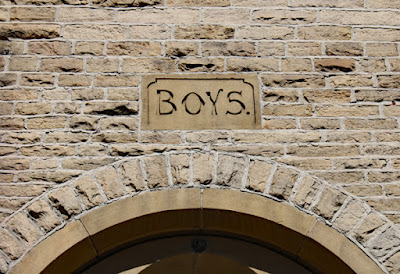 |
| The Sheffield School Board crest |
On the last week of May 2021, a few days after my walk from St. John’s church in Throapham to North Anston, when I had another good look at various buildings of the Permian Cadeby Formation, I turned my attention again to the Sheffield Board Schools.
Arriving on the X54 bus from Treeton at Commercial Street, before catching the tram to Netherthorpe Road, I couldn’t resist taking photos of the frieze sculptures by Philip Lindsey-Clark, dated 1938, which adorn the former gas showroom.
I had become aware of his later work in Sheffield at the Catholic churches of St. Theresa of the Child Jesus at Manor and the Sacred Heart in Hillsborough, where he had had used what looks like Lincolnshire Limestone for his sculptures, but here it is a variety of Portland limestone that has an unusual amount of voids.
Less than 15 minutes later, I had arrived at the Grade II Listed former Netherthorpe Board School, which was built in 1873 to the design of CJ Innocent, of the Sheffield based architectural practice Innocent and Brown.
Of the board schools that I had seen to date, 9 had been the work of Innocent and I was becoming very familiar with his trademark recessed arched windows, with herringbone masonry details and trefoils and also the Sheffield School Board crest, which depicts the Roman goddess Minerva.
As with the other schools that I had seen at Carbrook, Pye Bank and Springfield for example, the school was subsequently extended in 1878 and again in 1884 when Innocent continued as a sole practitioner after the death of his partner.
The extensions, including a caretaker’s house, are built in a much simpler style that reflects the dismissal of Innocent as a retained consultant and the award of design contracts being subject to open competition among architects such as Edward Robson and others.
Excluding the Central Schools centred on Leopold Street, this was the 18th school that I had visited in the past 3 months and having seen Crawshaw Sandstone and Stoke Hall stone used for the walling and dressings in some of these, as well as in other buildings, I think that it is likely that this combination of stones has been used at the Netherthorpe Board School.
Certainly, the sandstone does not look like the other principal building stones seen in Sheffield – the Rivelin Grit, Loxley Edge Rock, Greenmoor Rock, Grenoside Sandstone, Silkstone Rock and Parkgate Rock; however, although fairly consistent in colour and texture and very often having the distinct buff colour and planar bedding associated with the Crawshaw Sandstone, in some places there are inconsistencies.









No comments:
Post a Comment